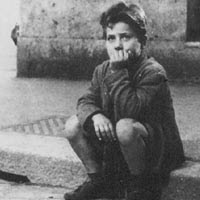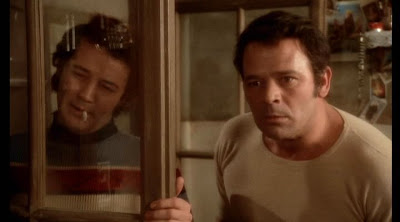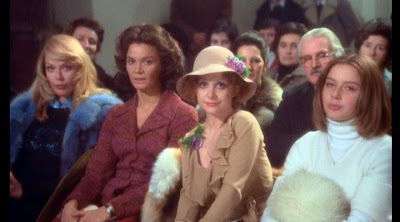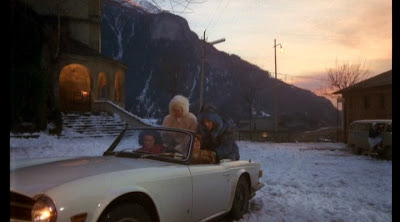FILM FESTIVAL

Screening of two rare classics of the Italian master
Shoeshine and Brief Vacation
14th December 2008 ; 10 am to 6 pm
Call : 94430 39630
VITTORIA DE SICA
As one of the world's most influential filmmakers, and as an actor who starred in some 150 movies, Vittorio De
 Sica built a remarkable film career that spanned half a century.
Sica built a remarkable film career that spanned half a century.De Sica directed 34 feature films, for which he won numerous international prizes. He was honored with four Academy Awards: two Special Awards, preceding the creation of the Best Foreign Film category, for "Shoeshine" in 1947, and "The Bicycle Thief" in 1949, and Best Foreign Film Awards for "Yesterday, Today and Tomorrow" in 1964, and The Garden of the Finzi-Continis in 1971.
De Sica was born in 1902 in Sora, near Rome, and grew up in Naples in a middle-class family. His father, Umberto De Sica, a bank clerk with a penchant for show business, encouraged his good-looking son to pursue a stage career. At 16, he appeared in the film "The Clemenceau Affair." His career took off in the 1920s when he joined a local theater company and became a matinee idol. He later formed his own company, producing plays and co-starring with his first wife, Giuditta Rissone. At the same time, he made a name for himself as a suave leading man in Italian films, and became immensely popular with female audiences.
During World War II, De Sica turned to directing. His first four films were routine light productions in the tradition of the Italian cinema of the day. But his fifth, "The Children Are Watching Us,"
 was a mature, perceptive, and deeply human work about the impact of adult folly on a child's innocent mind. The film marked the beginning of De Sica's collaboration with author and screenwriter Cesare Zavattini, a creative relationship that was to give the world two of the most significant films of the Italian neorealism movement, "Shoeshine" and "The Bicycle Thief."
was a mature, perceptive, and deeply human work about the impact of adult folly on a child's innocent mind. The film marked the beginning of De Sica's collaboration with author and screenwriter Cesare Zavattini, a creative relationship that was to give the world two of the most significant films of the Italian neorealism movement, "Shoeshine" and "The Bicycle Thief."To finance his directorial efforts, De Sica worked as an actor throughout his career. He turned almost exclusively to acting in the late 1950s, enjoying great popularity in the role of the rural police officer in Comencini's "Bread Love and Dreams" (1954), and in a subsequent comedy series of the same name co-starring Gina Lollobrigida.
He made a dramatic comeback with The Garden of the Finzi-Continis , produced by Arthur Cohn. The director's next movie was "A Brief Vacation" (1973), a moving film, also produced by Arthur Cohn, about a working-class Italian woman's first taste of freedom in a society dominated by males. His last film, "The Voyage" (1974), was based on a novella by Pirandello.Vittorio De Sica died in 1974 at the age of 72.
(Source ;: Internet)
Country : Italy
Italian with English subtitles
Run time :93 min
 A master at portraying stark realities of poverty while retaining glimmers of hope and humanity, De Sica constructs a poignant yet unsentimental film that compels audiences to weep openly by the end.
A master at portraying stark realities of poverty while retaining glimmers of hope and humanity, De Sica constructs a poignant yet unsentimental film that compels audiences to weep openly by the end.As Pauline Kael describes, "It is one of those rare works of art which seem to emerge from the welter of human experience without smoothing away the raw edges, or losing what most movies lose--the sense of confusion and accident in human affairs."
 Vittorio De Sica creates a l ucid, sincere, and impassioned portrait of poverty, corruption, and desolation in Sho eshine. From the introductory images of ubiquitous American soldiers at an economically (a n d perhaps, militarily) ravaged town (note their presence at the sanctuary of the horse rental stable as well as the high-traffic streets where the shoeshine boys eke out a meager living from their almost exclusively foreign patrons), De Sica establishes a recurring metaphor for the pervasive external, environmental factors that invariably exert an influence (if not govern) Giuseppe and Pasquale's lives that exist beyond their control.
Vittorio De Sica creates a l ucid, sincere, and impassioned portrait of poverty, corruption, and desolation in Sho eshine. From the introductory images of ubiquitous American soldiers at an economically (a n d perhaps, militarily) ravaged town (note their presence at the sanctuary of the horse rental stable as well as the high-traffic streets where the shoeshine boys eke out a meager living from their almost exclusively foreign patrons), De Sica establishes a recurring metaphor for the pervasive external, environmental factors that invariably exert an influence (if not govern) Giuseppe and Pasquale's lives that exist beyond their control.In essence, it is this exte
 rnal force - the "outside gentleman" that the fortune teller foretells - that serves, not only as an oblique reference to the presence of Allied occupation forces in postwar Italy, but also as a representation of th e country's sentiment over their ambivalence and inutility towards the direction and scope of the reconstruction in their own country. Moreover, Pasquale's orphaning during the war and the status of Giuseppe's family as refugees forced to share a single room at a multi-family boarding house further underscore the boys' (and, in turn, the country's) sense of transience, dislocation, and impotence over their own plight and the determination of their future. It is through this systematic disillusionment that the indelible bookend image of the two friends and their beloved white horse becomes, not a euphoric expression of unbridled freedom, but a desperate, resigned rejection of its severe, inscrutable, and dehumanizing course.
rnal force - the "outside gentleman" that the fortune teller foretells - that serves, not only as an oblique reference to the presence of Allied occupation forces in postwar Italy, but also as a representation of th e country's sentiment over their ambivalence and inutility towards the direction and scope of the reconstruction in their own country. Moreover, Pasquale's orphaning during the war and the status of Giuseppe's family as refugees forced to share a single room at a multi-family boarding house further underscore the boys' (and, in turn, the country's) sense of transience, dislocation, and impotence over their own plight and the determination of their future. It is through this systematic disillusionment that the indelible bookend image of the two friends and their beloved white horse becomes, not a euphoric expression of unbridled freedom, but a desperate, resigned rejection of its severe, inscrutable, and dehumanizing course.(Source : Internet)
 BRIEF VACATION
BRIEF VACATIONYear : 1973
Country :
Run time : 112 min
 In movies like "Shoeshine" and "Bicycle Thief" he told the stories of poor people trying to survive in a system geared up to manhandle them. His films grew slicker and more commercial by the 1960s, but he never lost his gift or his heart, and there were masterpieces like "The Garden of the Finzi-Continis" (1972) and now this final return to a working-class subject.
In movies like "Shoeshine" and "Bicycle Thief" he told the stories of poor people trying to survive in a system geared up to manhandle them. His films grew slicker and more commercial by the 1960s, but he never lost his gift or his heart, and there were masterpieces like "The Garden of the Finzi-Continis" (1972) and now this final return to a working-class subject.
It's a "woman's picture" of the new sort, the kind in which women make up their own minds and make their own mistakes. His heroine, Clara (a luminous performance by Florinda Bolkan), is harassed and bone-tired and driven to shouting things like "I'd do better as a whore" while she faces the bathroom mirror at dawn. But she has resources she never dreamed she owned.
She leads a grim existence as a factory worker. Her husband has been hit by a motorcycle and is laid off with a broken leg. Her brother-in-law spies on her and her mother-inlaw spits on her. She's been diagnosed as a tuberculosis victim and sent to a sanitorium in the mountains, courtesy of the National Health Service. And now she has met a young man who is desperately in love with her.
This is a woman who tells her husband it will take the police to get her back to
For the screenplay of "A Brief Vacation," de Sica returned to his old collaborator Cesare Zavattini, the man who wrote "Bicycle Thief" and "Shoeshine." It's as if, at 73, he wanted to touch base again in case this was going to be his last film.
(Source : http://rogerebert.suntimes.com)






No comments:
Post a Comment